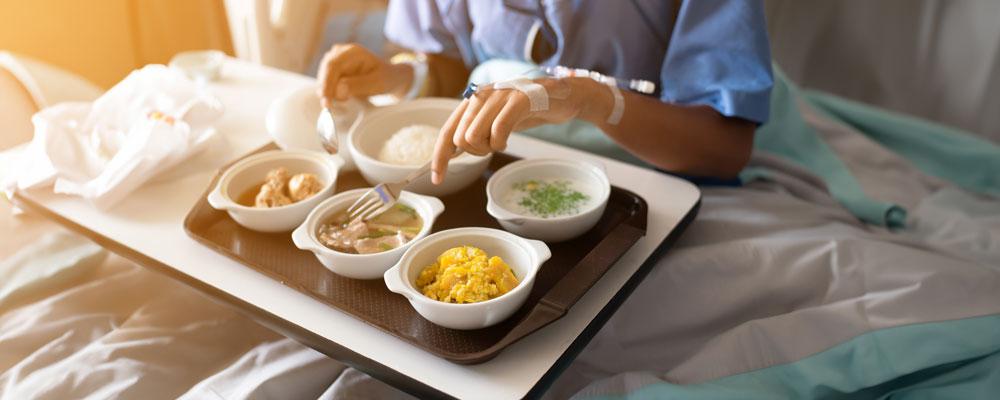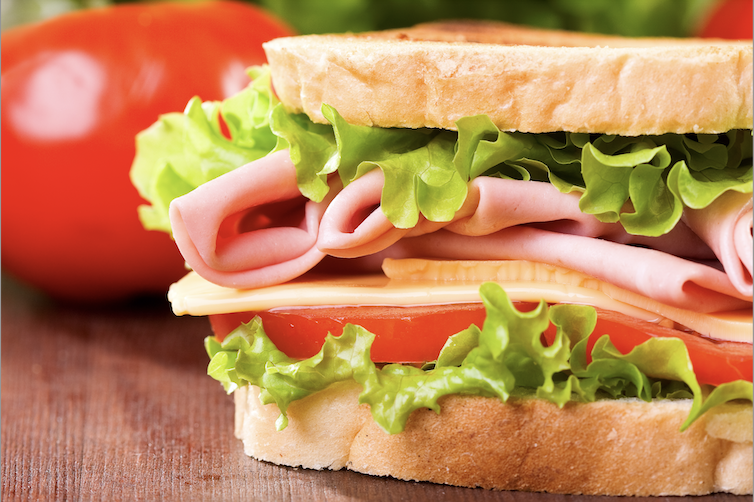NHS Supply Chain supports the outcomes of the Independent Review of NHS Hospital Food with the Chef’s Academy
In October 2020, the report from the Independent Review of NHS Hospital Food was published. The report focuses on the main challenges for NHS catering and makes recommendations in eight areas for system-level change.
The report’s recommendations include investment in the professional development of NHS chefs and catering staff, working towards healthier food for NHS staff, patients and visitors, and ensuring that nutrition and hydration is a mandatory part of health and care professionals’ training.
The outbreak of Covid-19 and the subsequent impact on the NHS has further highlighted the importance that nutritious food is widely available throughout NHS hospitals, both for the recovery of patients and for the well-being of staff.
NHS Supply Chain is committed to providing trusts with products and services that improve hospital food. We have introduced various initiatives, such as developing our nutritionally balanced culinary concepts and inviting NHS chefs to take part in our Chef’s Academy programme, which directly support the recommendations within the report.
About the Chef’s Academy
Recommendations 1C, 1D and 1F from the review include career-long professional development for NHS chefs and catering staff, marketing and recruitment for hospitals chefs and recognising excellence amongst catering staff.
NHS Supply Chain: Food launched the Chef’s Academy in 2020. The programme invites NHS hospital chefs to free training days with live demonstrations, hands-on cooking, and guest speakers. It gives NHS caterers the opportunity to network with peers and share best practice in a kitchen setting. The events are hosted by the NHS Supply Chain: Food team’s culinary specialists and are designed to inspire innovation and professional development amongst NHS chefs and catering staff.
Nick Vadis, Culinary Specialist at NHS Supply Chain, said: “By giving this opportunity to NHS chefs we hope to encourage a better world for staff and for those enjoying food at NHS hospitals – something supported by the Independent Review of NHS Hospital Food 2020.”
Nutrition and well-being are important premises of the Chef’s Academy sessions. Either our in-house nutritionist or our in-house dietician join each of the sessions to provide a 40-minute presentation on relevant areas of nutrition. So far, this has included the fortification of meals for malnourished patients and how to adapt recipes to suit different dietary requirements. For example, ensuring alternative vitamin and protein sources are present in plant-based or vegetarian dishes.
The recipes used in the sessions have been developed by our culinary teams specifically for NHS use and are all mapped to our approved ranges of products on our Multi Temperature Distribution (MTD) Framework. From November 2020 to November 2021, we are launching six culinary concept ranges. Each concept is centred around a culinary theme that is crafted with insights from consumer trends, with the objective of providing greater variety to consumers whilst also increasing revenue within retail environments.
The first three of these culinary concepts have already been launched. The ‘Khana Khana’ range, which includes Indian street-food inspired vada pav’s (Indian-style burgers) and traditional curries, the pan-Asian inspired ‘Bamboo’ range and our latest ‘Root Kitchen’ range, which consists of plant-based vegan and vegetarian dishes. The further three upcoming culinary concepts will be launched over the next six months and will be demonstrated at future Chef’s Academy sessions.
The dishes prepared also come with nutritional analysis and have been designed to complement hospital food standards. Of our main dishes launched to date, 75 per cent are 600 calories or less, 70 percent meet with salt reduction targets, and 95 percent meet with sugar reduction targets. We will soon be providing NHS chefs with a tool that provides a nutritional overview of recipes, allowing chefs to easily search for dishes with specific nutritional values, such as high fibre or low sugar, to suit patient needs.
The Chef’s Academy programme is our response to a gap in training and resources available to NHS chefs. By offering these opportunities to chefs we can assess the positive affects that this could have on staff retention, motivation, and importantly, the impact on the food produced in NHS environments.
Completed sessions
Due to Covid-19 restrictions, the Chef’s Academy programme was placed on hold at the start of this year. After consideration, it was decided not to replace the sessions with virtual events as they are designed to involve interactive cooking demonstrations and hands-on learning with culinary experts.
Since lockdown restrictions have eased, we have held nine Chef’s Academy events in culinary colleges across the UK so far.
These include:
• Squarefood Foundation Kitchen, Bristol, 30 October 2020
• Harborne Food School, Birmingham, 24 March 2021
• University of West London, Ealing, 30 March 2021
• West Herts College, Watford, 8 April 2021
• South Downs College, Waterlooville, 13 April 2021
• Foodsorcery Cookery School, Didsbury, 27 April 2021
• Leeds City College, Leeds, 12 May 2021
• University of West London, Ealing, 24 May 2021
A total of 82 NHS chefs and culinary staff have joined the sessions to date, and the response from our attendees has been overwhelmingly positive, with an average feedback score of 9.6 out of 10.
Robbie Deeming, from Essex Partnership University NHS Foundation Trust, said it was ‘a brilliant course, I gained a lot of knowledge’ whilst Paul Sibley from Dorset Healthcare University NHS Foundation Trust said the course was ‘very interesting and enjoyable’.
Following up with attendees
The follow-up after each academy event is important to us, as we intend for the recipes and skills developed at each Chef’s Academy session to be reflected by our attendees in NHS kitchens around the country.
Therefore, we develop all of our recipes and demonstrations to suit an NHS kitchen environment. All attendees receive a recipe sheet with the necessary information and support to embed the new recipes into their workplaces. Where appropriate, we also have discussions about pricing in staff and visitor restaurants in order to increase revenue in retail environments.
Phil Shelley, chair of the NHS Food Review attended the Chef’s Academy session alongside the NHS Supply Chain team in Ealing. He said: “It was a great session. Seeing things like menu plans, nutritional analysis and the expertise of NHS Supply Chain’s Culinary Lead Nick Vadis resulted in excellent plant-based meals from the Root Kitchen range created by the NHS chefs on the day. There’s no doubt that the Chef’s Academy has created a buzz.”
Summary
The Chef’s Academy events have inspired innovation amongst NHS chefs and culinary staff. The sessions have already supported a move towards positive change in food in NHS environments by introducing new and exciting dishes. The recipes are ambitious but achievable, with an understanding of the limitations that NHS kitchens may face.
We are hopeful that Chef’s Academy sessions can begin to bridge the gap in culinary training, as outlined in the Independent Hospital Food Review of 2020, as NHS Supply Chain aims to encourage professional development amongst NHS chefs through the sessions.
Nick Vadis, our Culinary Lead, explained: “We have been so pleased with the passion we have seen from attendees. There is a definite appetite for learning and development from NHS chefs. The academy events provide a necessary space to pause, reflect, and grow.”
We are currently finalising a selection of venues and dates for the second block of Chef’s Academy sessions available across the country from July onwards. If you are interested in joining a session, please join the waiting list here and one of our team will be in touch.
About NHS Supply Chain’s role in the Covid-19 response
- The government has set up new PPE Dedicated Supply Channel which is a parallel supply chain to the normal NHS Supply Chain service. It has been set up by government to meet the urgent volume requirements for core personal protective equipment (PPE) items, allowing NHS Supply Chain to focus on ensuring the supply of medical devices and clinical consumables to our NHS.
- The government has set up a dedicated unit to focus on securing supplies of PPE led by the government’s commercial function. This unit is identifying PPE suppliers from across the globe to meet the increasing demand for a growing list of PPE products. NHS Supply Chain’s PPE buying teams have been seconded to the unit which is led by the government.
- NHS Supply Chain has expanded its operations to support the stand up of seven NHS Nightingale Hospitals set up across the UK, including NHS Nightingale London, Birmingham, North West (Manchester), Yorkshire and the Humber (Harrogate), Bristol, North East (Washington) and Exeter. Equipment and consumables supplied include ventilators, patient monitors and CT scanners.
About NHS Supply Chain
NHS Supply Chain manages the sourcing, delivery and supply of healthcare products, services and food for NHS trusts and healthcare organisations across England and Wales. Managing more than 4.5 million orders per year, across 94,000 order points, 17,465 locations and delivering 25 million lines of picked goods to the NHS. NHS Supply Chain system consolidates orders from over 800 suppliers, saving trusts time and money and removing duplication of overlapping contracts.
Lord Carter’s report into efficiency and productivity in the NHS, published in 2015, identified unwarranted variation in procurement across the NHS, resulting in the need to improve operational efficiencies to transform a fragmented procurement landscape. To undertake this transformation the Department of Health and Social Care established the Procurement Transformation Programme (PTP) to deliver a new NHS Supply Chain.
The new NHS Supply Chain was designed to help the NHS deliver clinically assured, quality products at the best value, through a range of specialist buying functions. Its aim is to leverage the buying power of the NHS to negotiate the best deals from suppliers and deliver savings of £2.4 billion back into NHS frontline services by the end of the financial year 2022/23.
The new model consists of eleven specialist buying functions, known as Category Towers, delivering clinical consumables, capital medical equipment and non-medical products such as food and office solutions. Two enabling services for logistics and supporting technology and transactional services which underpin the model.
Key benefits the NHS Supply Chain will bring NHS trusts and suppliers include:
NHS trusts
• Savings channelled back to frontline services
• Releasing more time for core clinical activities
• Greater NHS clinical involvement in purchasing decision
• More effective introduction of new products.
Suppliers
• Lowering sales and marketing costs
• Single route into the national market
• A joined-up approach across the NHS
• Clear route for innovative products.
On 1 April 2018, a new commercially astute management function of the new NHS Supply Chain called Supply Chain Coordination Limited (SCCL) went ‘live’. The management function is responsible in driving strong commercial capability, providing a relentless approach to creating value, gain competitive advantage, become the strategic procurement partner of choice for the NHS, manage the delivery and performance of the Category Tower Service Providers and its enabling logistics and technology services whilst overseeing continuous improvement. SCCL is a limited company, wholly owned by the Secretary of State for Health and Social Care, SCCL is part of the NHS family.
For more information on our category service tower providers go to https://www.supplychain.nhs.uk/categories/.
About CaPA
The Clinical and Product Assurance (CaPA) team of NHS Supply Chain is key to ensuring that all the products we supply are safe and reflect the needs and preferences of all our NHS partners.
This includes working with our NHS partners such as NHS England, NHS Improvement and the National Institute for Health and Care Excellence (NICE) to support the introduction of new technology and innovation into the supply chain that provides demonstrable benefits for our patients and users.
The CaPA team is responsible for three key areas of expertise:
- Assurance framework
- Patient safety
- Innovation





